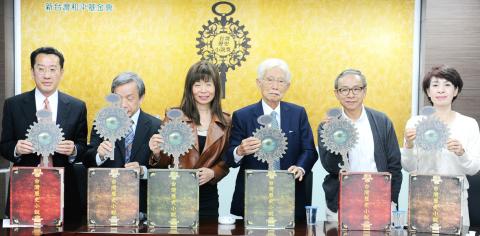A private foundation has offered a top prize of NT$1.2 million (US$39,600) for a historical fiction competition that encourages local writers to write about people and historical events in Taiwanese history.
The New Taiwan Peace Foundation, founded by Taiwan independence advocate Koo Kwang-ming (辜寬敏), announced the competition format yesterday at a press conference.
Koo, 89, said the competition would pay back the country he loves and that it is important “for the current generation to understand where their ancestors came from.”

Photo: Chang Chia-ming, Taipei Times
The foundation, established with Koo’s donation of US$100 million — about half of his assets — is to begin accepting entries in September next year and the winner is scheduled to be announced in December next year.
Known for his outspokenness, Koo also addressed several political issues yesterday, including the Democratic Progressive Party’s (DPP) election of a new chair and the next presidential election.
Koo said DPP Chairman Su Tseng-chang (蘇貞昌), former DPP chairperson Tsai Ing-wen (蔡英文) and former premier Frank Hsieh (謝長廷) were all unqualified for the DPP chairmanship, but if he had to make a choice, he would pick Su over the others.
The DPP election is scheduled to be held in May.
Koo reiterated his theory that Taiwan is not mature enough to have a female president and said that was why he would not support Tsai’s presidential bid in 2012.
In the presidential election in 2016, he said the DPP should be represented by the younger generation, such as Greater Tainan Mayor William Lai (賴清德) or DPP Legislator Lin Chia-lung (林佳龍), who will be running in the Greater Taichung mayoral race in November.

Several Chinese Nationalist Party (KMT) officials including Chairman Eric Chu (朱立倫) are to be summoned for questioning and then transferred to prosecutors for holding an illegal assembly in Taipei last night, the Taipei Police said today. Chu and two others hosted an illegal assembly and are to be requested to explain their actions, the Taipei City Police Department's Zhongzheng (中正) First Precinct said, referring to a protest held after Huang Lu Chin-ju (黃呂錦茹), KMT Taipei's chapter director, and several other KMT staffers were questioned for alleged signature forgery in recall petitions against Democratic Progressive Party (DPP) legislators. Taipei prosecutors had filed

Taiwan would welcome the return of Honduras as a diplomatic ally if its next president decides to make such a move, Minister of Foreign Affairs Lin Chia-lung (林佳龍) said yesterday. “Of course, we would welcome Honduras if they want to restore diplomatic ties with Taiwan after their elections,” Lin said at a meeting of the legislature’s Foreign Affairs and National Defense Committee, when asked to comment on statements made by two of the three Honduran presidential candidates during the presidential campaign in the Central American country. Taiwan is paying close attention to the region as a whole in the wake of a

NEW WORLD: Taiwan is pursuing innovative approaches to international relations through economics, trade and values-based diplomacy, the foreign minister said Taiwan would implement a “three-chain strategy” that promotes democratic values in response to US tariffs, Minister of Foreign Affairs Lin Chia-lung (林佳龍) said. Taiwan would aim to create a “global democratic value chain,” seek to capitalize on its position within the first island chain and promote a “non-red supply chain,” Lin was quoted as saying in the ministry’s written report to the Legislative Yuan submitted ahead of the legislature’s Foreign Affairs and National Defense Committee meeting slated for today. The Ministry would also uphold a spirit of mutual beneficial collaboration, maintaining close communication and consultations with Washington to show that Taiwan-US cooperation

President William Lai (賴清德) has appointed former vice president Chen Chien-jen (陳建仁) to attend the late Pope Francis’ funeral at the Vatican City on Saturday on his behalf, the Ministry of Foreign Affairs said today. The Holy See announced Francis’ funeral would take place on Saturday at 10am in St Peter’s Square. The ministry expressed condolences over Francis’ passing and said that Chen would represent Taiwan at the funeral and offer condolences in person. Taiwan and the Vatican have a long-standing and close diplomatic relationship, the ministry said. Both sides agreed to have Chen represent Taiwan at the funeral, given his Catholic identity and